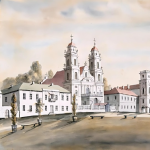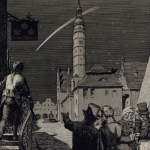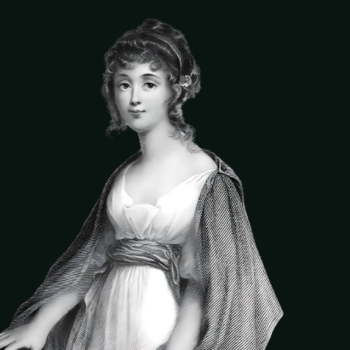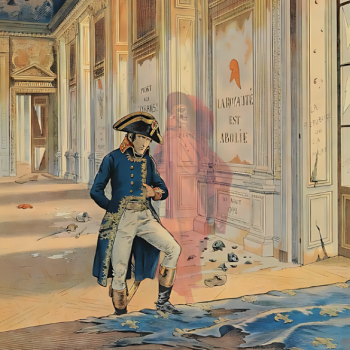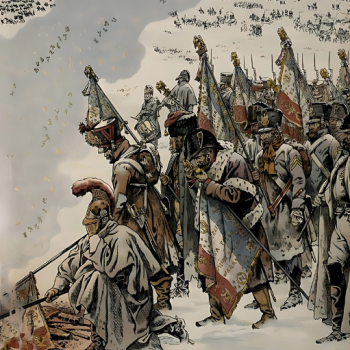A Tournament Of Shadows:
XX. Let Our Destinies Be Accomplished
Bernadotte had not been at home long when the ministry appointed him to defend Antwerp against the English (who had landed at Walcheren.) He did this successfully, but when Napoleon heard of the appointment, he sent Bessières to supersede him. Napoleon and Bernadotte soon reconciled. Bernadotte would even be made Governor of Rome, but he declined when he received some surprising news in the summer of 1810.[1]
Of all the Marshals of France, it was Bernadotte who was most favorably known in Northern Europe, Prince of Ponte Corvo. As Governor of Hanover (and later as Governor of the Hanseatic Towns) he made his mark as a capable administrator. At the taking of Lübeck, he was noted for his compassion towards the inhabitants and his clemency towards his Swedish prisoners. He had distinguished himself as commander of an army corps on the Baltic shores and in the Polish Campaign of 1807. His career aside, public interest in Sweden was attracted to Bernadotte by his chivalrous bearing and picturesque personality. Among Bernadotte’s partisans were Count Gustave Mörner (the Commander of the Swedish prisoners at Lübeck,) and his kinsman, Baron Otto Mörner (a Lieutenant of the Utland Regiment of Infantry) who was the messenger for (Sweden’s) King Charles XIII. With no heir to the throne, the Swedish king needed a successor. It was Mörner who first helped to organize a party in favor of Marshal Bernadotte.
Mörner put the proposition to Bernadotte in an interview. There was nothing strange in such a proposal, indeed, the ascent to a throne was but “the topmost rung of the ladder of a Marshal’s ambition.” Napoleon even seemed to beckon his subordinates to reach the heights to which he had climbed. Bernadotte considered the offer carefully and gave a non-committal reply. If the offer was genuine, he would accept it only with the approval of Napoleon, and only after he was assured that it represented the wishes of the King of Sweden.
Napoleon’s thoughts on the matter wavered from day to day. He failed to appreciate the strength of Bernadotte’s reputation. He was disposed to look about for a French Prince nearer to himself, one who would be more dependable from his own point of view. Napoleon considered transferring Murat from Naples to Sweden, his brother Jerome from Westphalia to Naples, and his brother Louis (who was giving trouble in Holland) to Westphalia. The marriage of Napoleon and Josephine was dissolved in December 1809, and in April 1810, he took for his second wife, Marie Louise, the daughter of Francis II (the Austrian Emperor.) Even so, for several days he even considered putting Josephine’s son, Eugène Beauharnais, on the Swedish throne. hearing that a Frenchman would have to adopt the Lutheran faith if he accepted the vacant succession, Marie Louise exclaimed: “What! Would the wretch give up his God for a crown? None of my family would ever have consented to such a thing.” Napoleon was impressed by this remark of his young bride and quickly decided that he would not entertain the idea of putting forward a member of his family further. Napoleon soon found out that the volume of personal esteem behind Bernadotte’s candidature was larger than he had imagined.
In the second week of July 1810, a new French candidate appeared on the scene. Napoleon’s brother, Louis Bonaparte, weary of his inglorious position as the titular King of a French satrapy, abdicated his throne. On July 9, Napoleon annexed Holland to the French Empire. Much attached to Louis’s wife Queen Hortense, Napoleon had taken a warm interest in their eldest boy, whom he intended to make “heir of his greatness. That child’s death, and his own marriage, had changed the current of the Emperor’s thoughts. Queen Hortense had two other sons, however, both of tender years, Napoleon Louis, and Louis Napoleon. The idea occurred to Napoleon that the vacant succession Sweden offered an opportunity to provide for one them. This project dissolved in Sweden, and Napoleon no longer put forth a French candidate.
“Well,” asked Napoleon of Bernadotte in late-July, “have you any news from Sweden?”
Bernadotte, instead of answering the question, came forward and asked Napoleon his own question. “Tell me frankly whether my election to the Swedish succession would be consistent with Your Imperial Majesty’s policy. Unless I am assured that it will not be inconsistent with your policy, I will prevent any further steps being taken in my favor.”
“Do nothing of the kind,” Napoleon replied. “Let things take their course. It is consistent with my policy and with that of Sweden that you should be placed there.”
There were some hang-ups during the election process regarding Bernadotte. Baron Lagerbielke, the Swedish Minister, was one of his supporters. On the night of August 15, Bernadotte thanked him for his support.
“Before we part,” said Bernadotte, “I owe you a frank profession of faith. Look at my past career. Think of the position from which I started and look at the position in which fortune has placed me. Do you suppose that a soldier of fortune, whose whole life, I dare affirm, offers no trait of ambition or of vanity, cannot be content with the degree of glory and of fortune to which favorable circumstances have raised him? He would be indeed insatiable to wish for more. He would be mad to aspire to the rank which is now in question. But he would be devoid of all feeling if he were not touched by being honored by the confidence of a nation such as yours—even if it were only a small minority of the nation. He would be a coward, yes, a coward—that is the word—if he were to refuse an honor because it was attended by risk, or to turn back from a path because it was bristling with obstacles and dangers. I am not one of the great people of the earth. I abandon myself to my destiny, but I shall never try to force it. I do not wish to compare myself to those brave men who seek death in battle, but I have made the resolution never to shrink from it. I offer my veneration to your respected Sovereign, my high esteem to the Swedish Nation. A love of right and fair play, rigid impartiality in the maintenance of order, the just recompense of merit, accessibility to all leadership in battle, considerateness and sympathy with the people, these are the promises which I make, and I shall keep them.”
Napoleon displayed a restless anxiety upon the subject of the pending election. Bernadotte’s caution asserted itself more and more as the hour of his destiny approached. On August 20, Bernadotte warned Napoleon in the clearest terms. “I will never consent to become King of Sweden except upon conditions of complete independence.”
The Parisian fortune teller was right. Bernadotte was named heir to the Swedish throne in September. On September 10, Napoleon sent him a letter which read:
“My cousin, I have given orders to the Grand Judge to make out Letters Patent authorizing you to accept the new dignity to which you have been called by the King and by the Diet of Sweden. I wish success and happiness to you and to the Swedes.” The Letters Patent contained a Clause binding the new Prince Royal of Sweden never to bear arms against France.[2]
Bernadotte refused to accept the Letters Patent with this restriction and declared that if Napoleon insisted, he would withdraw his acceptance of the Swedish offer. He declared that he would not agree to any condition or limitation upon his obligations as a subject of the King of Sweden.
“I cannot submit to the obligation which you propose,” said Bernadotte. “My election as Prince Royal of Sweden makes it impossible for me to contract any engagement that would make me the vassal of a foreign country.”
Napoleon showed a disposition to insist.
“Sire,” said Bernadotte with characteristic promptitude and presence of mind, “would you make me a greater man than yourself by obliging me to refuse a Crown?”
Napoleon hesitated for a moment. “Very well, go!” he exclaimed. “Let our destinies be accomplished!”
“I beg your pardon, Sire,” said Bernadotte. “I did not catch what Your Majesty said.”
“Go!” repeated Napoleon, “let our destinies be accomplished!”[3]
SOURCES:
[1] Troubetzkoy, Alexis S. Imperial Legend: The Mysterious Disappearance Of Tsar Alexander I. Arcade Publishing. New York, New York. (2002): 102.
[2] “These Letters Patent give you authority to become a Swede. One Clause only has been added to the effect that you personally cannot bear arms against France. The restriction is in conformity with the constitution of the Empire; it agrees with your own inclinations; and it is not opposed to the obligation of the throne which you are destined to ascend, which can never except in utter madness be at war with France.”
[3] Barton, Dunbar Plunket. Bernadotte And Napoleon, 1763-1810: Vol. II. John Murray. London, England. (1921): 255-307.


